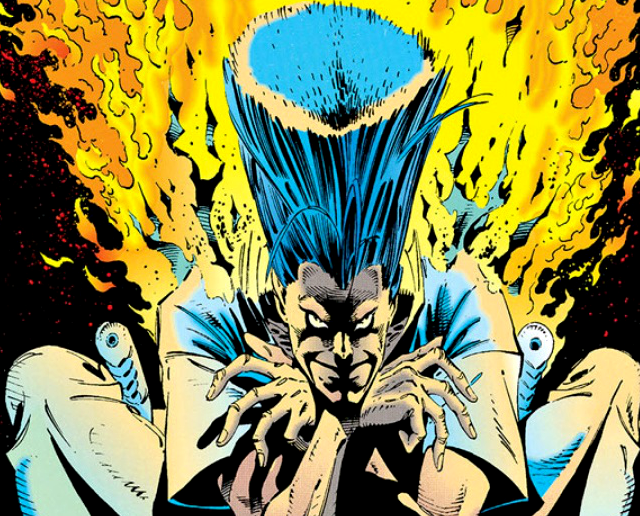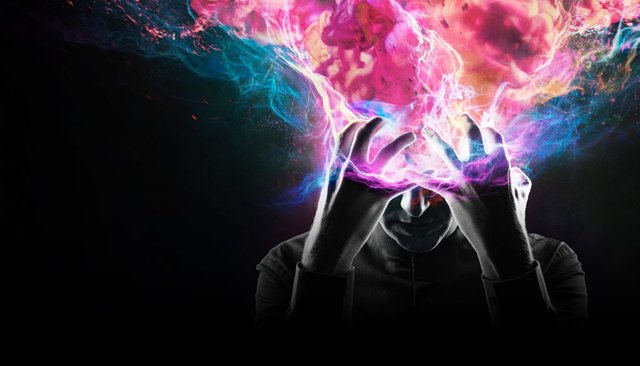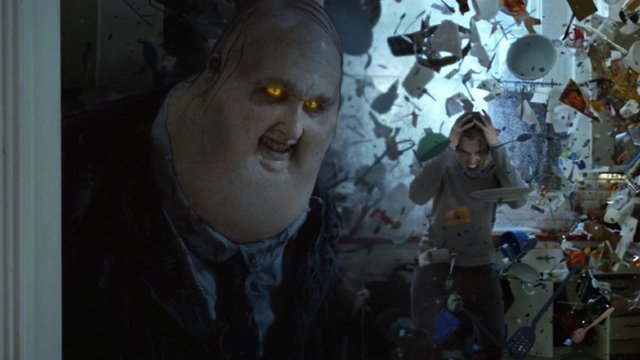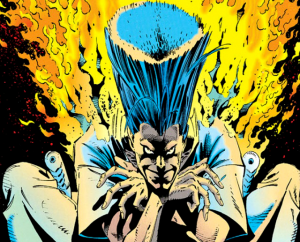God Has A Mental Illness

Schizophrenia, psychosis, and Super-powers
[Spoiler Alert] The Marvel Television series Legion is a poignant insight into the human condition, in the only way that science-fiction can: by questioning normality.
You say my eyes,
Are crazy eyes.
Sometimes they are,
And so are you.
— Jane’s Addiction

image source
I started reading Marvel’s X-Men titles in the early 90’s just as the Muir Island Saga began. So one of the first mutants I encountered in my reading was David Haller, the psychic son of Professor Charles Xavier. What I loved about reading X-Men was the focus on uniqueness, and the inalienable human rights of everyone, including the freaks. Amongst the ranks of this mutant band of heroes were blacks, women, homosexuals, and all manner of marginal voices. To me, the X-Men always represented diversity and the struggle — in its diversity of forms — against homogeneity and hegemony.
Haller is a powerful psychic/telepath who, through traumatic experience becomes dissociated and splits into multiple personalities wielding powerful mutant abilities — hence the moniker Legion (“for he is many”). This tragic character’s story centred around the question of mental illness in a person with very powerful mutant super-abilities.
With Haller, he was never a ‘bad guy’ as such. All the bad guys are typically evil — they want to take over the world, dominate others, or push their own personal agendas. Most of the ‘X-Baddies’ are usually playing out the human v. mutant trope. Haller on the other hand wasn’t motivated by such — he was just literally mentally ill.
Or was he? Can one who suffers from a mental illness be absolved of personal responsibility?
This line of questioning is a theme in the Marvel Television series, which has just finished its second season on the FX channel (a third season has been confirmed). It is visually stunning, with a clever use of editing, visual and audio effects (not to mention a killer soundtrack created and curated by Jeff Russo) to create a surreal narrative, a hybrid of William Burroughs, David Lynch, and a creepy acid trip.
In the series, Haller is diagnosed with Schizophrenia. His early life goes as one would expect: happy childhood, things start to go wrong, failed relationships, drug use and attempted suicide which leads to institutionalisation. He comes to accept his fate until he discovers that his experiences — hearing other voices, and so on — are the results of his mutant telepathic powers.
This scenario raises so many questions about our understanding of mental illnesses such as Schizophrenia, one which is a benefical poke at the presuppositions of how these conditions are described, diagnosed, and understood (not to mention treated). But there is more to David’s story than apparently mis-diagnosed mental illness and mutant superpowers (to detail further would be a spoiler).
The lunatic is in my head.
You raise the blade, you make the change,
You re-arrange me ’til I’m sane.
You lock the door, and throw away the key,
There’s someone in my head but it’s not me.
— Pink Floyd
As is usual for all the X-narratives, government forces want to either eliminate or control any super-powered folk because of the perceived threat to ‘national security’. All of Marvel’s Mutant titles have never feared to broach the topic of the thin line between ‘national security’ and fascist authoritarianism.
Here’s the thing — bad guys with super-powers that want to kill the innocent and enslave people should be stopped; I’m yet to meet anyone that would disagree with that. The idea of an evil mutant like the Shadow King who has the power to remove my free will creeps me out. So yes, I would expect the ‘good guys’ to take out a ‘bad guy’ like him.
The existence of a majority logically implies a corresponding minority
— Philip K Dick, Minority Report
The idea of preventing atrocities and crimes by halting a potential criminal before they can develop the urges or impulses to behave in such a manner is a highly controversial and dystopian idea that Philip K Dick often wrote about. So the idea of locking up children with super-powers that could potentially be a threat is one that shocks us. At what point does this kind of prevention become a subversion of not just liberties, but also the exercision of free will, we should ask.
In Legion, the idea is that any behaviour that is different is treated as a mental illness. By the end of season one, we ask whether David’s tendencies were a result of his super-power, his mental illness, or his adverse childhood experiences, and drugs (both illegal and prescribed).
Did Psychiatry treat David’s psychosis, or create it?
The moon is high up on a mountain.
The lunatics have taken over the asylum,
Waiting on the rapture.
— Radiohead
The show is cleverly constructed, as we are never really sure what is ‘real’ in the narrative or not? Flashbacks, cuts, ‘fantasy’ sequences, and dissociated dialogue are all employed so that we are constantly questioning the reality that we consider ‘normal’. This is what good SF literature does. This series in particular is a fine example of the type of ‘soft’ SF that started to appear in the 60’s and 70’s (‘soft’ referring to the ‘soft sciences’ like psychology, philosophy, & sociology, as opposed to the engineering/physics-focussed ‘hard sciences’).

image source
Chaos and madness
By the end of the second season (again, won’t go into too many details, because: spoilers) ourselves, as well as the protagonists, are left questioning ‘what is real’?
The post-modern idea of moral relativism is under heavy critique at present. There is a benefit in questioning our assumptions of ‘good guys v. bad guys’ in a time when previously marginalised voices now have the channels to speak louder than before. For those of us who feel safe with the idea of a singular authority however, this notion throws us into chaos.
Who are we to believe? Which truth is real? Which news is fake? Who can we trust to tell us what to do, what to believe, etc?
This can seem like madness and paranoia, at least that has been my experience of it. A character such as David Haller is a great archetype for this. The instability of order, which threatens our internal sense of safety and security is part of natural human psyche. Zen monks use cleverly-worded koans to disrupt our normal cognitive reasoning (in NLP, called a ‘pattern interrupt’).
Legion challenges me to consider who am I… really? Are my behaviours the result of my conditioning? Or have I been born to think/feel in ways that are limiting (the genetic argument)? Or do I choose to behave in these ways? Confucius, Mencius, and Xun Zi tackled this idea in their time, and yet I’m still not sure we have found any answers to this — a testament to the epistemic chaos this line of questioning will always send us into.
Now you know that you are real,
Show your friends that you and me
Belong to the same world.
— The Moody Blues
The question what is real? in the context of the morality and authenticity of my actions is one that I find fascinating and perplexing. If any such thinking was going to act like a virus-hack on my mental programming, it would be this one.
[Spoiler alert!] In the closing scenes we are presented with the judgement to call: who is the monster? Given much of the evidence came from the Shadow King, is it to be trusted, even though his previous actions should be enough to label him as the ‘baddie’. But then what about David’s actions throughout the story — his single-handed attack on the government agency, his torture of Oliver, and then the use of his powers on the woman he loves. Can he still be called a ‘good guy’? Do those actions constitute a ‘pattern’? And how much of the pattern observed has more to do with filtering certain facts based on the framing of the evidence?
All the nightmares came today,
And it looks as though they’re here to stay.
— David Bowie
And herein lies the true madness at the heart of all these issues. Life, the universe, and everything has no order; there is no singular, absolute Truth (emphasis on the capital ‘T’). At least, this is true when it comes to the complexity of the human experience — and the perception of that experience (and also not true at the same time).
It is, literally, sheer madness. Existence is pure crazy. Heck, you just need to spend a little time with news, media, and social media and you’ll be hearing multiple, disjointed, incongruent voices… just like any schizophrenic does.
And if this crazy universe is the result of some Creator-deity… well, it just goes to prove that they too must be clinically insane.
That, or they have a wicked sense of humour!
Originally published by Petah Raven on July 26, 2018.
Canonical link
Exported from Medium on August 1, 2018.
Canonical link
Exported from Medium on August 1, 2018.


 |  |
|---|
Posted from my blog PANDORA'S LOST GIFT with SteemPress : http://metametheus.net/god-has-a-mental-illness/

great read, I can't believe I slept on Legion
is right up my alley. But this question of Reality and Who Am I, is something I constantly deal with, I think it was back in the day when I took a good amount of shrooms, and my best friend Joe was having a moment, he went down on his knees, and looked to the skies, yelling What have I become!! this memory is burnt into my awareness, and I always half-jokingly ask myself this, with my eyes to the sky.
but this view of mental illness is a very interesting one, I'll leave this comment with a quote by the sage of the modern age
Congratulations! This post has been upvoted from the communal account, @minnowsupport, by 📀 Petah Raven [metametheus] from the Minnow Support Project. It's a witness project run by aggroed, ausbitbank, teamsteem, someguy123, neoxian, followbtcnews, and netuoso. The goal is to help Steemit grow by supporting Minnows. Please find us at the Peace, Abundance, and Liberty Network (PALnet) Discord Channel. It's a completely public and open space to all members of the Steemit community who voluntarily choose to be there.
If you would like to delegate to the Minnow Support Project you can do so by clicking on the following links: 50SP, 100SP, 250SP, 500SP, 1000SP, 5000SP.
Be sure to leave at least 50SP undelegated on your account.
Hi @metametheus!
Your post was upvoted by @steem-ua, new Steem dApp, using UserAuthority for algorithmic post curation!
Your UA account score is currently 3.211 which ranks you at #8130 across all Steem accounts.
Your rank has not changed in the last three days.
In our last Algorithmic Curation Round, consisting of 298 contributions, your post is ranked at #277.
Evaluation of your UA score:
Feel free to join our @steem-ua Discord server